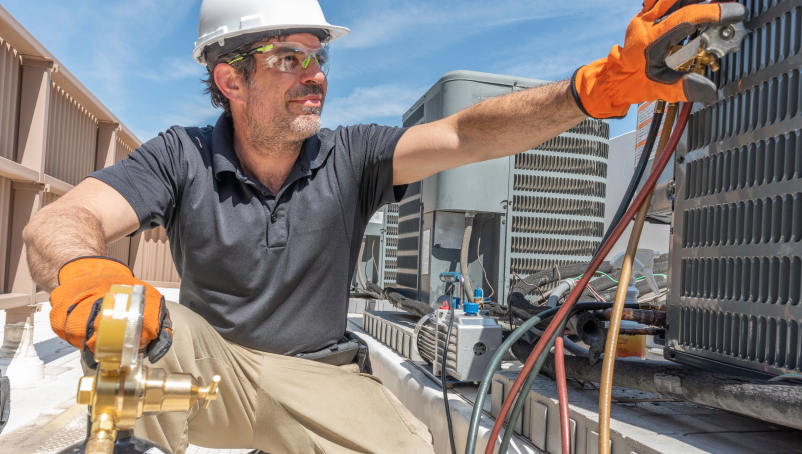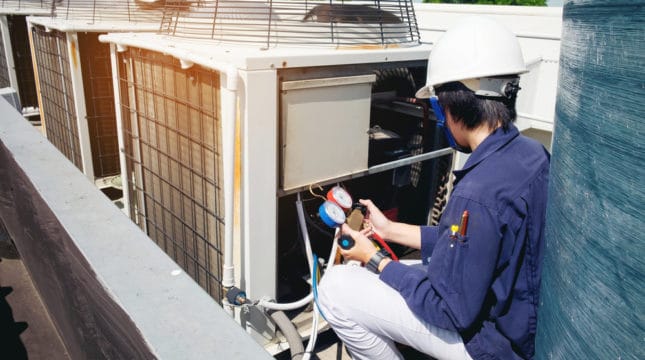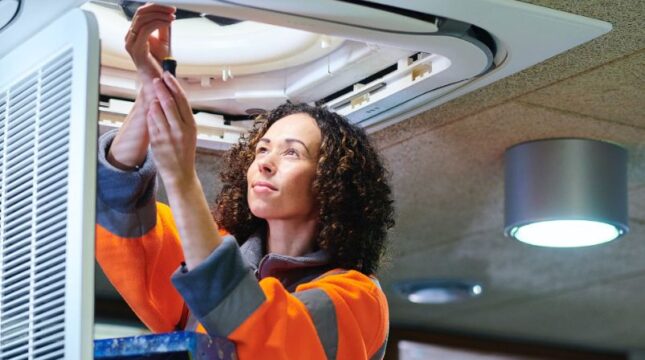Do you need an HVAC license in Utah?
Yes, you will need a license to work as an HVAC contractor and run a business. The state only offers one type of HVAC license: specialty contractor license S350.
Good news: the HVAC industry is on an upward swing, with the Bureau of Labor Statistics projecting a 9% job growth from 2023 to 2033, much faster than the average for all occupations. With an HVAC license in Utah, contractors can fabricate and install heating, air conditioning and ventilating systems. They may also install refrigeration equipment, including built-in refrigerators, refrigerated rooms, insulated refrigerated spaces and other related equipment.
While they may not perform any electrical, plumbing or natural gas-related work, they can hire or subcontract work to a licensed professional.
Environmental Protection Agency (EPA) certification
HVACR technicians and contractors must obtain a certification from the EPA to handle refrigerants.
Professionals conducting refrigerant line-pressure tests or handling or adding refrigerant to existing air conditioning systems are required to get the Section 608 Technician Certification.
EPA certifications for refrigerants are available in four types:
- Type I for small appliances
- Type II for high-pressure units
- Type III for low-pressure appliances
- Universal for all HVAC systems and appliances covered under these types.
Certification exams are specific to the equipment the technician wants to work on and must be administered by an EPA-approved certifying organization. Section 608 Technician Certification credentials do not expire.
Registered HVAC apprentices are exempt from certification requirements if they are closely and continually supervised by a certified technician.
Insurance for HVAC licensed contractors in Utah
The state of Utah mandates that you carry general liability insurance and workers’ comp insurance (if you have employees) to maintain your HVAC license. The following are key types of HVAC insurance to consider when running your own business in the Beehive State.
Workers’ Compensation insurance
Workers’ comp coverage in Utah can help provide wage protection and other benefits if you or your employees get hurt on the job.
The Utah Labor Commission requires every Utah employer (with some exceptions) to provide workers’ compensation coverage for all its employees. If you have employees, to get and keep an HVAC license, you need:
If you do not have employees, you must get a workers’ compensation coverage waiver from the Utah Labor Commission.
Learn more about workers’ compensation for contractors.
General Liability insurance
HVAC contractors must have a general liability insurance policy with the minimum required coverage of $100,000 for each incident and $300,000 in total. The certificate of insurance should list the DOPL as a certificate holder.
General liability insurance in Utah can help cover some of the most common accidents at a business, including property damage and if someone other than an employee gets hurt.
Learn more about general liability insurance for contractors.
Commercial Property insurance
If you operate your business from an office or keep your equipment stored in a physical location, commercial property insurance can help cover costs related to damage or vandalism affecting property you own or rent for your business.
Business Owner’s Policy
A business owner’s policy, or BOP insurance, provides broad coverage of general liability and commercial property policies combined in a single, cost-efficient bundle. It can help cover damage that you or your employees may accidentally cause to another person’s property and help protect your business equipment in the event of a fire or other covered event.
Tools and Equipment insurance
While not required by law, tools and equipment insurance is valuable for contracting businesses. This policy helps provide repair and replacement coverage if something happens to your work gear, like damage or theft.
Commercial Auto insurance
You may wrack up some miles traveling between job sites. Commercial auto insurance can help cover costs related to accidents involving your work vehicle, such as property damage or medical expenses. Even if you drive a personal vehicle, check with your insurance provider as they may not cover work-related activities.
In Utah, the minimum amount of auto coverage is:
- $25,000 per person and $65,000 per accident for bodily injury to others.
- $15,000 per accident for property damage liability.
How to get a Utah HVAC license
Here are the steps for getting a Utah HVAC license.
1. Take the pre-licensure course
All specialty contractors require a 25-hour pre-licensure course. HVAC technicians and contractors can take their course from:
Sources cover basic business practices, accounting, insurance, construction law and management skills.
As a specialty contractor, you aren’t required to take the Business and Law exam.
2. Register your business
If your HVAC business is a corporation, limited liability company (LLC) or partnership, you must register with the Utah Division of Corporations.
3. Get a federal Employer Identification Number (EIN)
EINs are issued by the IRS for tax administration. You can use your social security number if you are a sole proprietor.
4. Get business insurance
Utah HVAC license holders must carry general liability insurance. To get licensed, you must provide a certificate of insurance with the minimum required coverage of $100,000 for each incident and $300,000 in total. DOPL must be listed as a certificate holder.
You must get workers’ compensation insurance with DOPL as a certificate holder if you have employees. You must also obtain a state withholding tax registration from the Utah State Tax Commission and unemployment registration from the Utah Department of Workforce Services.
If you don’t have employees, you must have a workers’ compensation coverage waiver from the Utah Labor Commission.
5. Submit your application and pay the fees
Fill out the Utah contractor license application provided by the DOPL. You can complete it online, in person or submit it by mail.
To apply for a Utah HVAC license, you must meet the following requirements:
- Completion of a 25-hour pre-license course.
- Proof of general liability insurance.
- Your business registration number.
- Your EIN.
- Proof of workers’ comp insurance or a coverage waiver.
Fees are based on the number of qualifiers and classifications you apply for. It costs $50 per qualifier and $175 for each classification, plus a $1 surcharge.
Contractor applications are reviewed and processed as the DOPL receives them. Generally the licensing process takes around 4-6 weeks.
Does Utah have license reciprocity with other states?
No. Utah does not have reciprocity. However, Utah has licensure by endorsement.
To apply, you must hold an HVAC license type deemed equivalent for at least one year. The license must be active and in good standing. You must complete an application for licensure, pay the application fees and submit official verification of your license.
Utah contractors license renewal
HVAC licenses in Utah expire on November 30 of odd years. DOPL will email a renewal notification at least 60 days prior to license expiration. The renewal fee is $119.
License renewal requirements:
- Complete 6 hours of continuing education.
- Have proof of unexpired general liability insurance.
- Have proof of unexpired workers’ comp insurance if you have employees.





